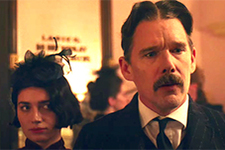Tesla
|  Michael Almereyda is clearly drawn to opaque, inwardly directed historical figures. Although he has made movies in a wide range of genres, including horror (1994’s Nadja), modern Shakespeare reworkings (2000’s Hamlet and 2014’s Cymbeline), and science fiction (2017’s Marjorie Prime), two of his past three films have been unconventional portraits of brilliant, but difficult men whose very nature pushes Almereyda to make films that challenge the generally rigid structure of the biopic. His previous effort, Experimenter (2015), was something of a noble failure in depicting the disturbing social-psychological experiments of Stanley Milgram in the 1960s. It was interesting and challenging, but it never quite took off because Milgram was such a vague and uninteresting character (at least as depicted in the film). One might think that a similar danger would await Almereyda’s newest film, Tesla, about the great electrical engineer, inventor, and futurist Nikola Tesla, who was instrumental in helping to design systems for carrying and distributing electricity in the late 19th century and early 20th century. A Serbian-born Austrian, Tesla immigrated to the United States and became a naturalized citizen in the 1880s. One the leading figures of electrical engineering, he developed alternating current and worked diligently toward a future in which power could be sent wirelessly. He fell into obscurity following his death in 1943, overshadowed by the monumental figure of Thomas Alva Edison, with whom he competed directly. Prior to this film, there had only been one biopic of Tesla—the Yugoslav film The Secret of Nikola Tesla (Tajna Nikole Tesle, 1980), which is remembered (if at all) primarily because it featured one of Orson Welles’s last on-screen performances as banker J.P. Morgan. Elegant, tall, handsome, and meticulously groomed, Tesla was a memorable figure for those who met him, and Ethan Hawke (in his third collaboration with Almereyda following Hamlet and Cymbeline) embodies his presence with great authority and ambiguity. Hawke’s performance is the kind that risks underappreciation because it is so intensely inwardly directed, yet that is the essence of Tesla’s character. Described by newspaper editor Arthur Brisbane as “almost the tallest, almost the thinnest and certainly the most serious man who goes to Delmonico’s regularly,” Tesla was an enigmatic figure who didn’t fit the mold; his outsider-ism was central to both his brilliant and unorthodox mind and his subsequent marginalization in favor of the more gregarious and effectively self-promoting Edison, who is here played by Kyle MacLachlan with equal measures of arrogant bombast and shrewd disingenuousness. The film clearly favors Tesla, who may have been socially awkward and hard to reach, but nonetheless remained true to himself, while Edison is portrayed as a slick opportunist who always had an eye on his legacy. Hawke and MacLachlan are perfectly opposed in style and substance, and their dueling performances fuel the conflict between their characters’ minds—not just intellectually, but practically and economically. Edison is all bluster and condescension, while Tesla is intensely introverted and quiet. He doesn’t speak much, but Hawke makes us feel the gears of Tesla’s mind constantly running. As he did with Experimenter, Almereyda takes significant liberties with the typical bounds and norms of the biopic. He eschews the traditional “Great Man” narrative, skipping over huge swaths of Tesla’s life to focus primarily on his most intense years developing alternating current, building a business relationship with the gregarious, bushy-bearded George Westinghouse (Jim Gaffigan), and competing with Edison. At various points Almereyda presents us with scenes that never happened in reality (or, at least, most likely didn’t happen), such as when Tesla and Edison get into an argument that ends with them sticking their ice cream cones on each other. The patent falsity of these moments is acknowledged by Anne Morgan (Eve Hewson), the daughter of banker J.P. Morgan (Donnie Keshawarz), with whom Tesla had a romantic relationship (he never married, though). Anne serves as a narrator, breaking the fourth wall and decades of history by using a Mac laptop and referencing Google, noting how few hits Tesla gets today in comparison to Edison. It is a self-conscious conceit that shouldn’t work, but somehow it does—if only barely. The same tricks didn’t really work in Experimenter because they felt too much like compensation for the lack of emotional intrigue and interest posed by Stanley Milgram. Hawke makes Tesla a much more intriguing figure, even as he remains opaque to both us and those around him. His mystery is deepened by the film’s outré aesthetic and narrative devices, and it all feels of a piece—not one that will appeal to everyone, especially those looking for a conventional biopic, but one that stays true to its own unique integrity. Copyright © 2020 James Kendrick Thoughts? E-mail James Kendrick All images copyright © IFC Films |
Overall Rating: 

 (3)
(3)


